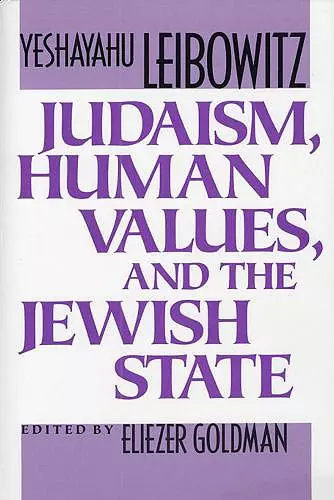Judaism, Human Values, and the Jewish State
Yeshayahu Leibowitz author Raphael Levy translator Yoram Navon translator Zvi Jacobson translator Gershon Levi translator Eliezer Goldman editor
Format:Paperback
Publisher:Harvard University Press
Published:10th Sep '95
Currently unavailable, and unfortunately no date known when it will be back

Yeshayahu Leibowitz's significance in contemporary Jewish intellectual life, and in Israel's political and intellectual life, is comparable to that of figures better known in the United States--Buber, for example, or Scholem. Leibowitz is more locally involved, and he is more openly polemical. But he is never mysterious or evasive, oracular or reticent. He just fights his battles, but the result of all his battles is a remarkably consistent doctrine. It remains lean and elegant--and, even for people who disagree, heartening and enlivening. -- Michael Waizer
These hard-hitting essays by Yeshayahu Leibowitz, the first to be published in English, constitute a comprehensive critique of Israeli society and politics and a probing diagnosis of the malaise that afflicts contemporary Jewish culture.
A biochemist by profession, a polymath by inclination and erudition, Yeshayahu Leibowitz has been, since the early 1940s, one of the most incisive and controversial critics of Israeli culture and politics. His direct involvement, compelling polemics, and trenchant criticism have established his steadfast significance for contemporary Israeli—and Jewish—intellectual life. These hard-hitting essays, his first to be published in English, cover the ground Leibowitz has marked out over time with moral rigor and political insight. He considers the essence and character of historical Judaism, the problems of contemporary Judaism and Jewishness, the relationship of Judaism to Christianity, the questions of statehood, religion, and politics in Israel, and the role of women. Together these essays constitute a comprehensive critique of Israeli society and politics and a probing diagnosis of the malaise that afflicts contemporary Jewish culture.
Leibowitz’s understanding of Jewish philosophy is acute, and he brings it to bear on current issues. He argues that the Law, Halakhah, is essential to Judaism, and shows how, at present, separation of religion from state would serve the interest of halakhic observance and foster esteem for religion. Leibowitz calls the religious justification of national issues “idolatry” and finds this phenomenon at the root of many of the annexationist moves made by the state of Israel. Long one of the most outspoken critics of Israeli occupation in the conquered territories, he gives eloquent voice to his ongoing concern over the debilitating moral effects of its policies and practices on Israel itself. This translation will bring to an English-speaking audience a much-needed, lucid perspective on the present and future state of Jewish culture.
The essays are incisive, provocative, fearlessly consistent… No one interested in Israel, Judaism and the nexus of the two can afford complacently to ignore the questions Leibowitz refuses to stop asking. -- Menachem Kellner * New York Times Book Review *
The most significant criticism of Israel that Israel has ever been handed by one of its own citizens. [Leibowitz] has a rare moral presence. -- Moshe Halbertal * New Republic *
The essays in this fine collection amply reveal Leibowitz’s unswerving consistency… At the same time, though, a close reading of the essays reveals tensions which, although possibly reconcilable, nevertheless point to a certain elasticity in this seemingly inflexible thinker. In the end, Leibowitz’s humanity stands revealed as much in these rare moments of inconsistency as in his fanatic adherence to principle. -- David Biale * Religious Studies Review *
Yeshayahu Leibowitz’s significance in contemporary Jewish intellectual life, and in Israel’s political and intellectual life, is comparable to that of figures better known in the United States—Buber, for example, or Scholem. Leibowitz is more locally involved, and he is more openly polemical. But he is never mysterious or evasive, oracular or reticent. He just fights his battles, but the result of all his battles is a remarkably consistent doctrine. It remains lean and elegant—and, even for people who disagree, heartening and enlivening. -- Michael Walzer
ISBN: 9780674487765
Dimensions: 235mm x 156mm x 23mm
Weight: 476g
328 pages